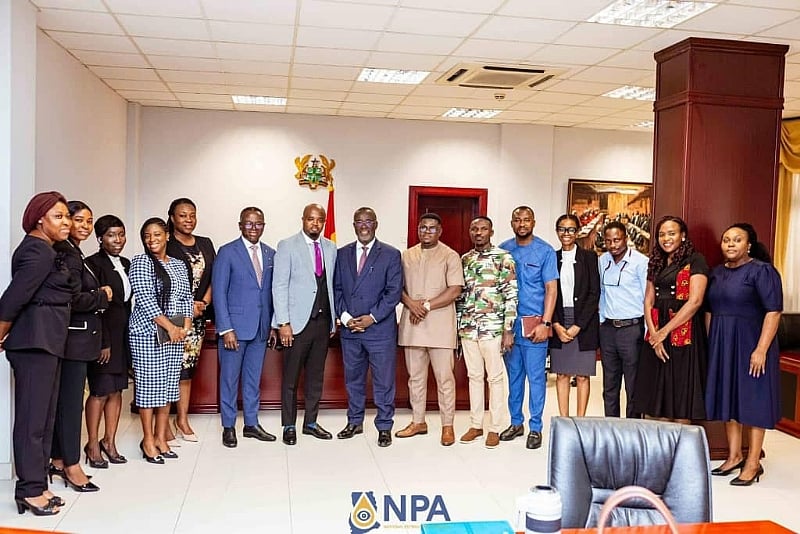The National Petroleum Authority (NPA) of Ghana is seeking to establish a dedicated Petroleum Court to expedite the prosecution of fuel-related crimes, aiming to bolster regulatory enforcement and protect the integrity of the downstream petroleum sector. NPA Chief Executive, Godwin Kudzo Tameklo, met with Acting Chief Justice Paul Baffoe-Bonnie to discuss this proposal, emphasizing the increasing complexity and criminal activity within the industry and the need for a more efficient judicial process. The rapid growth and diversification of Ghana’s downstream petroleum sector since 2005 have outpaced the development of the regulatory framework, leaving the industry vulnerable to criminal exploitation. The NPA believes a specialized court or designated judge handling petroleum cases will provide the necessary expertise and speed to effectively address these issues. Delays in the current court system, according to Tameklo, undermine the NPA’s mandate to safeguard national economic and energy security, as protracted legal proceedings weaken confidence in the regulatory framework and allow offenders to continue operating with impunity.
The proposed Petroleum Court would not only expedite the prosecution of offenders but also serve as a powerful deterrent, sending a clear message that criminal activity in the petroleum sector will not be tolerated. Tameklo highlighted the NPA’s role as a key national security stakeholder, stressing the importance of judicial support in upholding the rule of law and protecting the public interest. He argued that the current system’s inability to swiftly address criminal infractions threatens both industry integrity and national economic security, particularly given the downstream sector’s crucial role in Ghana’s energy supply. The NPA’s prosecutorial powers, granted in 2020, remain underutilized due to the slow pace of the existing judicial system. A dedicated Petroleum Court would empower the NPA to effectively exercise these powers and hold offenders accountable.
Justice Baffoe-Bonnie expressed support for the concept of a specialized court for petroleum cases, acknowledging the frustrations caused by protracted trials. He agreed that swift justice is crucial for deterrence, emphasizing that criminal prosecution is not simply about punishment but also about sending a clear message to potential offenders. However, he cautioned that the existing shortage of judges and the heavy caseloads across all court levels present a significant challenge to the immediate establishment of a fully independent Petroleum Court. While acknowledging the merits of a dedicated court, the Acting Chief Justice proposed a more pragmatic interim solution: designating an existing court to allocate specific days, perhaps two days every two weeks, exclusively to petroleum-related cases. This approach, while not creating a separate court, would provide a dedicated forum with a clear mandate to focus on the unique legal challenges of the petroleum industry. This dedicated time slot, effectively functioning as a “Petroleum Court,” would offer a more immediate solution while addressing the current resource constraints within the judiciary.
Justice Baffoe-Bonnie lamented the pervasive culture of indiscipline across Ghanaian society, highlighting its detrimental impact on various sectors, including the petroleum industry. He stressed the importance of consistent and decisive law enforcement to combat this trend and emphasized that swift justice serves as a crucial deterrent against illegal activities. The Acting Chief Justice connected the proposed Petroleum Court to this broader issue of national discipline, arguing that effectively addressing crime within the petroleum sector would contribute to a stronger rule of law across Ghana. His remarks underscore the significance of the NPA’s initiative not only for the petroleum industry but also as a potential model for addressing indiscipline in other sectors.
The establishment of a Petroleum Court, whether as a fully independent entity or as a designated track within an existing court, would represent a significant advancement in strengthening the regulatory framework of Ghana’s downstream petroleum sector. By expediting the prosecution of offenders, such a court would enhance the NPA’s enforcement capabilities, protect consumers, and promote industry integrity. It would also signal a strong commitment to upholding the rule of law and deterring criminal activity within a sector vital to Ghana’s national security and economic well-being. The proposed collaboration between the NPA and the judiciary is a crucial step towards realizing this goal.
The NPA’s proactive approach, coupled with the Acting Chief Justice’s willingness to explore solutions, indicates a shared understanding of the urgent need to address the legal challenges facing the downstream petroleum sector. The proposed Petroleum Court, in whatever form it ultimately takes, holds the potential to significantly enhance the efficiency and effectiveness of legal proceedings related to petroleum offences. This will not only benefit the industry itself but also contribute to broader efforts to strengthen the rule of law and promote responsible economic development in Ghana. The outcome of this initiative will be closely watched as a potential model for addressing similar challenges in other sectors of the Ghanaian economy.














